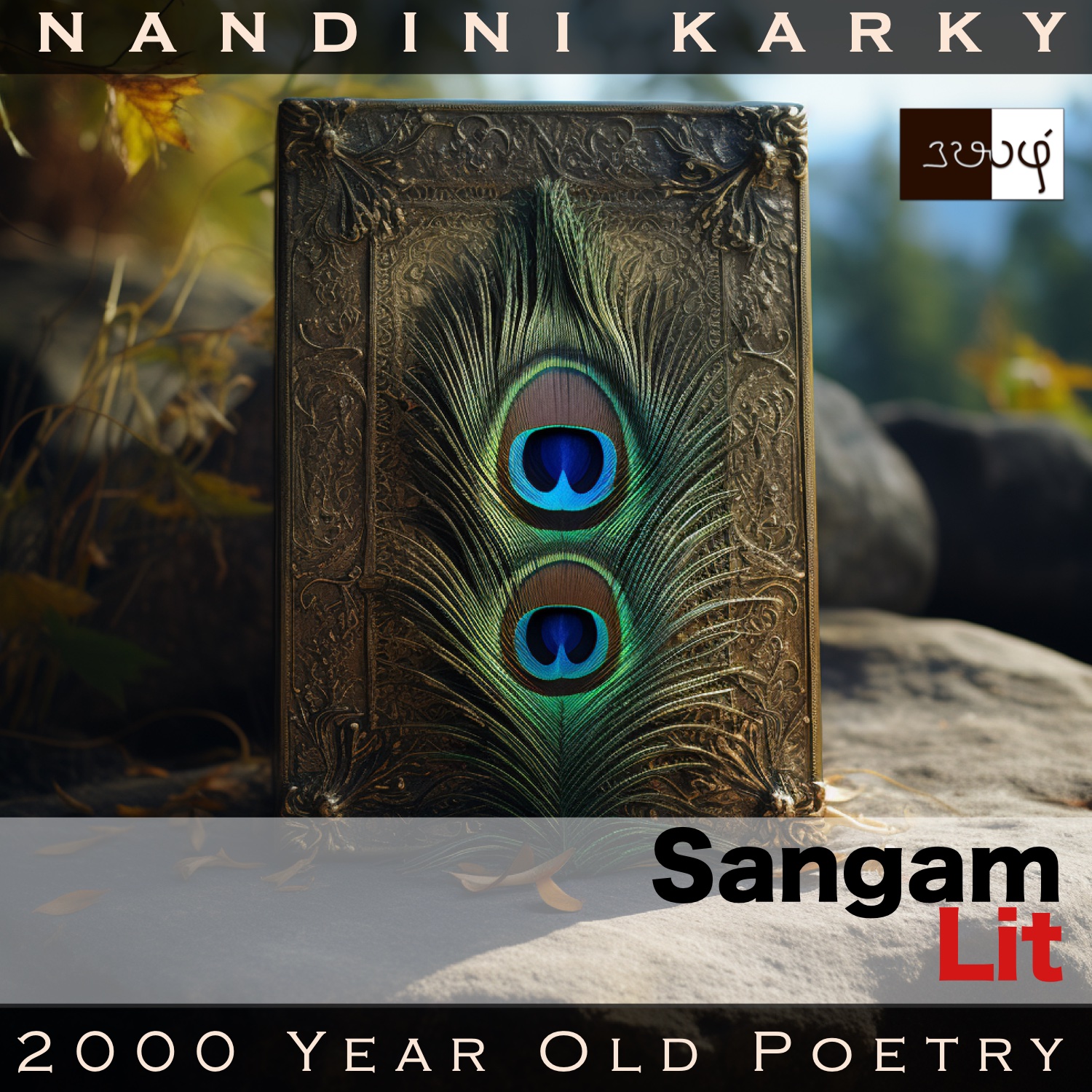Podcast: Play in new window | Download
Subscribe: Apple Podcasts | Spotify | Amazon Music | Android | iHeartRadio | TuneIn | RSS | More
In this episode, we perceive the despair felt at the loss of a leader, as depicted in Sangam Literary work, Puranaanooru 260, penned by the poet Vadamothankizhaar. Set in the category of ‘Karanthai Thinai’ or ‘Cattle Recovering’, the verse sketches the tale of a man who fought against his foes.

வளரத் தொடினும், வௌவுபு திரிந்து,
விளரி உறுதரும் தீம் தொடை நினையா,
தளரும் நெஞ்சம் தலைஇ, மனையோள்
உளரும் கூந்தல் நோக்கி, களர
கள்ளி நீழல் கடவுள் வாழ்த்தி,
பசி படு மருங்குலை, கசிபு, கைதொழாஅ,
‘காணலென்கொல்?’ என வினவினை வரூஉம்
பாண! கேண்மதி, யாணரது நிலையே:
புரவுத் தொடுத்து உண்குவைஆயினும், இரவு எழுந்து
எவ்வம் கொள்குவைஆயினும், இரண்டும்,
கையுள் போலும்; கடிது அண்மையவே
முன் ஊர்ப் பூசலின் தோன்றி, தன் ஊர்
நெடு நிரை தழீஇய மீளியாளர்
விடு கணை நீத்தம் துடி புணை ஆக,
வென்றி தந்து, கொன்று கோள் விடுத்து,
வையகம் புலம்ப வளைஇய பாம்பின்
வை எயிற்று உய்ந்த மதியின், மறவர்
கையகத்து உய்ந்த கன்றுடைப் பல் ஆன்
நிரையொடு வந்த உரையன் ஆகி,
உரி களை அரவம் மான, தானே
அரிது செல் உலகில் சென்றனன்; உடம்பே,
கானச் சிற்றியாற்று அருங் கரைக் கால் உற்று,
கம்பமொடு துளங்கிய இலக்கம் போல,
அம்பொடு துளங்கி ஆண்டு ஒழிந்தன்றே;
உயர் இசை வெறுப்பத் தோன்றிய பெயரே,
மடம்சால் மஞ்ஞை அணி மயிர் சூட்டி,
இடம் பிறர் கொள்ளாச் சிறு வழி,
படம் செய் பந்தர்க் கல் மிசையதுவே.
A long song after quite a while! The poet’s words can be translated as follows:
“Even when forcibly struck, speaking only in subtle notes, the lute’s sweet strings let out a melancholic ‘vilari’ melody. Thinking about that, with your downcast heart, seeing the drying tresses of your wife, praying to the god that lived in the shade of the cactus tree in the drylands, with hunger tearing your stomach, with hands folded, sorrowfully you ask, ‘Will I see him?’. O bard! Listen well to the state of our your future! Whether you will seize the lands he left us and eat from that or you will rise up at night in a deep angst, it’s in your hands;
Many fighters appeared in this village with uproar and captured his huge herd of cattle. They showered arrows upon him, while he swam towards them with his drum as his raft, and brought victory by killing them. Akin to the moon that escaped the clutch of the snake, which had made all earth lament, he recovered his many cattle from the hands of those enemies and returned home. Akin to a snake that sheds its skin, he shed his body and parted away to the difficult-to-attain higher world; Akin to a pillar that serves as target practice, standing on the rough shores of the small, wild river, his form is lying down, ridden with arrows;
The name of the man who lived with such soaring fame, is now decorated with picturesque feathers of the innocent peacock, and shines on the memorial stone placed in a small path under a cloth canopy!”
Let’s take a deeper look at the verse. The poet starts by narrating the current state of the bard saying even when he tries to play a cheerful tune by forcibly plucking the strings of his lute, all his lute seems to render is the sorrowful ‘vilari’ melody. The bard is disturbed by this and at the sight of his wife’s drying hair. This image symbolically implies the poverty of the bard and as we have seen in other poems, to let one’s woman be without oil meant inauspicious things for the household in those times. So, wanting to remedy this situation, the bard had walked to this village, after leaving a prayer en route at the shrine of a god under the cactus tree in the drylands. With hope in his heart, he seems to have asked this poet whether he would get to see the patron. The poet replies to him in an abstract fashion saying that whether this bard chooses to eat from the lands the leader has left or goes on to suffer with angst at night, wondering if he should part away with the leader, that was something to be determined by the bard.
To explain the reason for this abstract state, the poet goes on to tell how enemies had captured cattle from this leader’s village. The leader, in response, went boldly to them and killing them, recovered his cattle. But upon returning to his village, he fell dead because of the enemy arrows that seem to have struck his form like a target practice pillar, the poet elaborates. And so all that’s left of the leader now, was his glorious name etched on a memorial stone, decorated with peacock feathers, he concludes. A verse that describes the dashing of someone’s hope, telling them how they take it, is in their hands!




Share your thoughts...